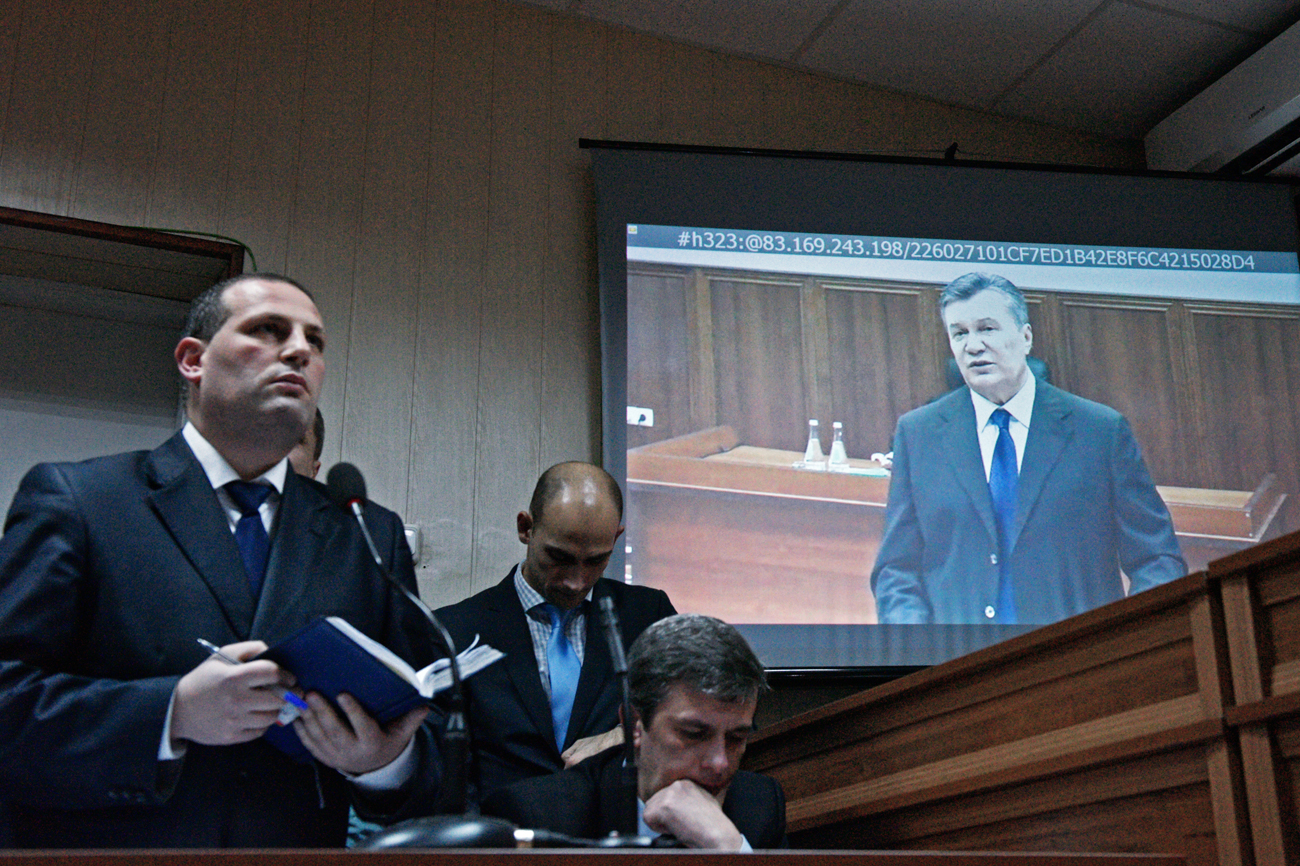
Former president of Ukraine Viktor Yanukovych, on the monitor, is seen here in Kiev's Svyatoshinsky Court as he testifies from Rostov Region Court via a video link on February 2014 unrest in Kiev.
RIA NovostiFormer Ukrainian President Viktor Yanukovych (2010-2014) has not set foot on Ukrainian soil since February 2014, when he fledt he country and sought asylum in Russia after a popular uprising against his government resulted in numerous deaths and injuries following clashes between security forces and protesters.
Now he has broken his silence to testify as part of an ongoing trial set up to investigate five ex-policemen accused of fatally shooting protesters in Kiev on Feb. 20, 2014. More than 70 civilians were killed in the Ukrainian capital during the demonstrations in late February, as well as a number of law-enforcement officers.
At a session of the Svyatoshinsky District Court in Kiev on Nov. 28 Yanukovych spoke remotely, through a video transmission from a courtroom in the Russian city of Rostov-on-Don (600 miles south of Moscow).
While the former Ukrainian president was giving testimony as a witness in the case, Ukraine's Prosecutor General Yury Lutsenko has said during the course of the trial that Yanukovych is also suspected of state treason.
The main reason for the mass protests that began on Kiev's Independence Square, or Maidan, in November 2013 was Yanukovych's refusal to sign Ukraine's association agreement with Europe. He was accused of ceding to pressure from Russia.
When asked why he had decided to halt the Euro-integration process, Yanukovych said that the agreement needed to be modified in order not to damage foreign trade. He noted that it would have been to his advantage to sign the popular agreement in order to be re-elected, but "there would have been no benefit for the country."
Speaking about the negotiations with opposition leaders, which lasted from November to February while demonstrations continued on the Maidan, Yanukovych stressed: "It was all a show, they were just stalling." He claims that he offered to create a new coalition government that would have included members of the opposition, but his proposals were refused.
The former president denied that he any connectionto the bloody clashes in the center of Kiev on February 18-21, 2014. "I could not sign an order to shed blood," said Yanukovych. "Let's have the Maidan leaders talk about what they've done to the country."
According to Yanukoyvch, he was told that during the days of bloodshed people were firing from the buildings that were controlled by the protesters. He also insists – despite a body of oral, video and photographic evidence to the contrary – that security agents were acting in accordance with the law and were not using weapons.
Yanukovych also said that as acting president the shootings on the Maidan were "disadvantageous" to him, that it was a provocation directed at him and the government. "I did everything possible to prevent the tragedy," he said, addressing the victims' families.
The former president denies that during the events on the Maidan he received instructions from Moscow. In particular, he said he did not meet with Russian presidential aide Vladislav Surkov, who came to Ukraine during the mass protests (according to Gazeta.ru, Surkov had come for secret talks with Yanukovych and other politicians).
Yanukovych admitted that after the protesters prevailed and seized a government district in Kiev, he fled to eastern Ukraine and from there to Russia. "If I had remained in Ukraine, it would have been dangerous not for me but for other people," he said. He explained that it was difficult to reach Russia from the eastern Ukrainian city of Donetsk, even though he was lawful president. "They tried to detain me illegally and when I was in the air they tried to send fighters," he said.
Yanukovych said that he was against the Crimean referendum and the peninsula’s “unification” with Russia, but it is Ukraine's new government that is to blame for the loss of Crimea, not him.
Representatives of the official government in Kiev, however, do not believe Yanukovych's testimony and consider him a traitor.
"The most that he could do was read the speech written for him," Gazeta.ru cites Ukrainian prosecutor Alexei Donskoi as saying in comments about Yanukoych. During the trial, Donskoi asked Yanukovych if he had indeed requested Russian President Vladimir Putin to use the Russian army in Ukraine (Russian Permanent Representative to the UN Vitaly Churkin made this statement on March 1, 2014). Tellingly, the ex-president did not answer the question.
In a conversation with Kommersant FM radio, deputy editor-in-chief of Polit.ru Boris Dolgin said that Ukraine has reasons to accuse Yanukovych of state treason.
"Let's imagine that a Russian citizen called on foreign troops to intervene in an incident taking place on Russian territory. Most likely Russian law-enforcement organs would also interpret this in a negative light," he said.
Dmitry Drize, a political observer at Kommersant FM, does not believe that Yanukovych said anything new. Drize is convinced that neither Kiev nor Moscow takes Yanukovych seriously and all he can do is occasionally remind everyone of himself in public declarations.
"After speaking in court Yanukovych will again fall into political oblivion and relations between the two countries will remain in a deadlock," said Drize.
All rights reserved by Rossiyskaya Gazeta.
Subscribe
to our newsletter!
Get the week's best stories straight to your inbox